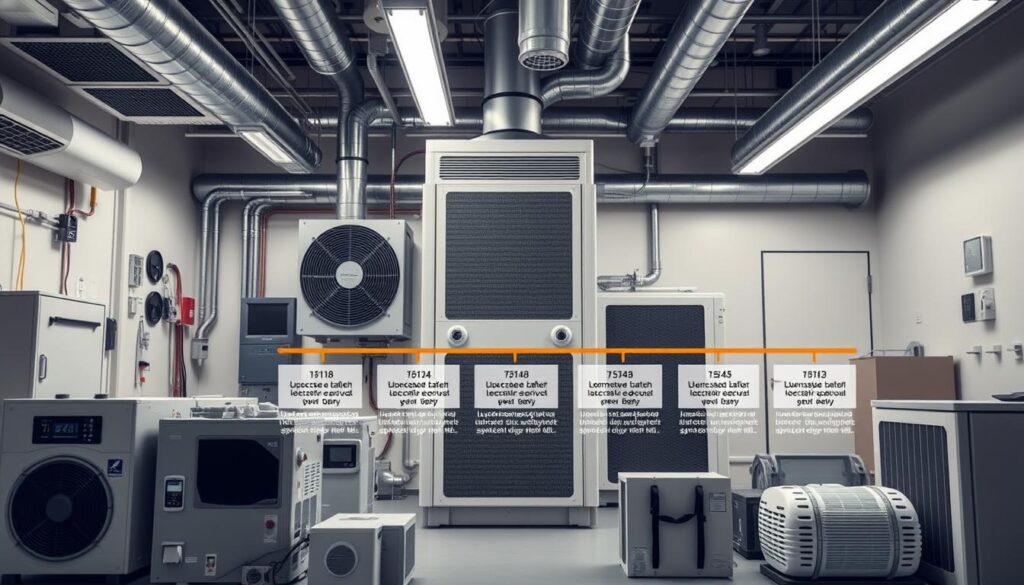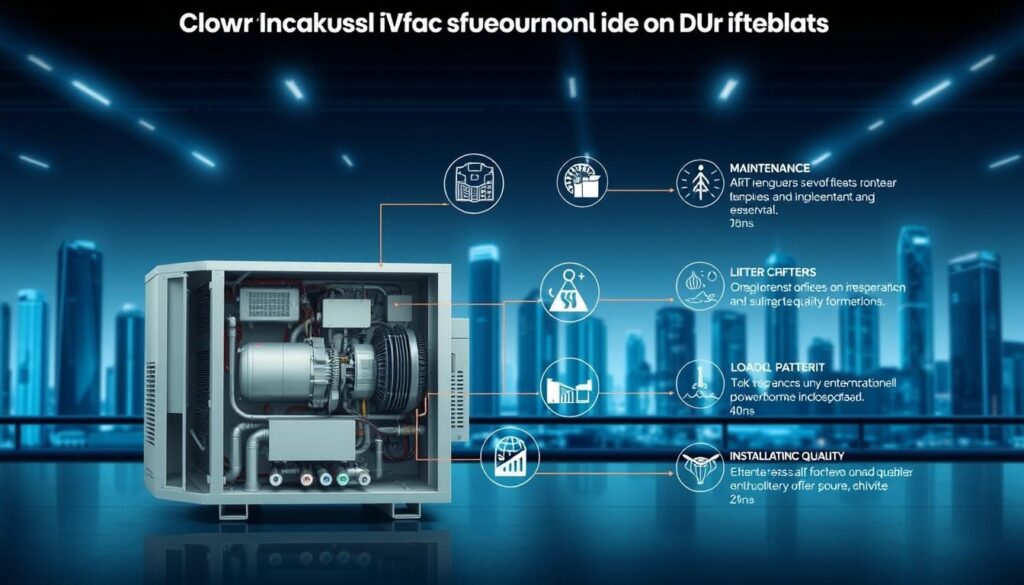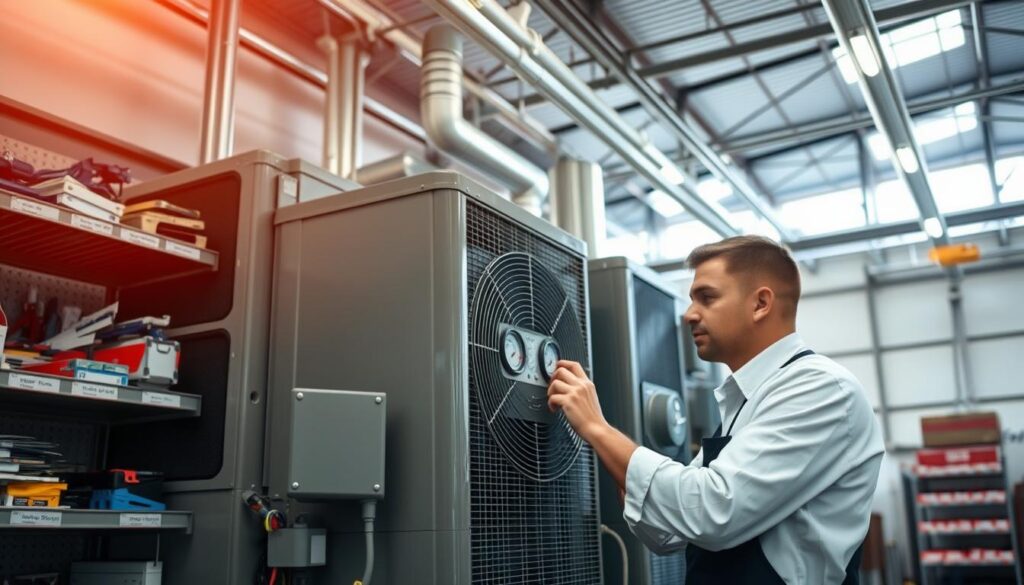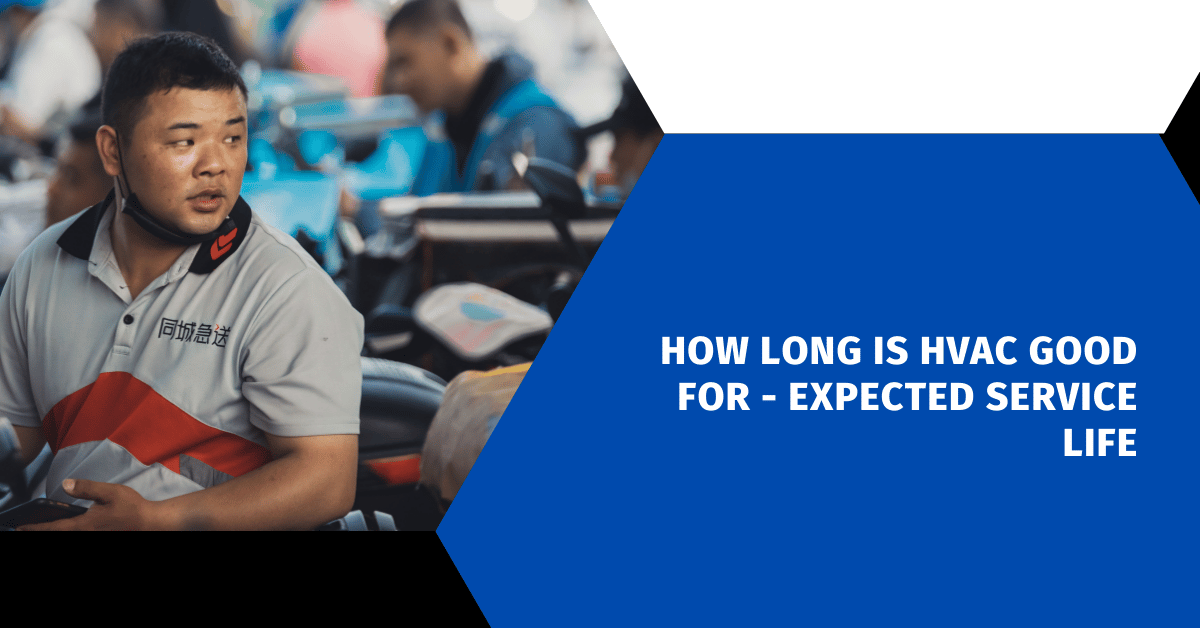Affiliate Disclosure
HVAC Guide Guys is a participant in the Amazon Services LLC Associates Program, an affiliate advertising program designed to provide a means for sites to earn advertising fees by advertising and linking to Amazon.
How Long Is HVAC Good For? Ever thought about how long your HVAC system will keep your home comfy? Knowing how long your heating and cooling will last can save you a lot of money. It also helps you plan for future needs.

The lifespan of your HVAC system can be anywhere from 15 to 25 years. But, it’s not the same for everyone. Things like how much you use it, the weather, and regular check-ups can change how long it lasts.
Knowing when to fix or replace your HVAC can prevent sudden failures. It also keeps your home comfortable and energy-efficient. We’ll look at all the things that affect how long your HVAC will last.
Key Takeaways
- Average HVAC lifespan ranges between 15-25 years
- Regular maintenance can extend system performance
- Different HVAC components have varying expected lifespans
- Climate and usage impact overall system durability
- Professional inspections are critical for longevity
Table of Contents
Understanding HVAC System Lifespans: The Basics
Your HVAC system is key to your home’s comfort. Knowing its lifespan helps with planning for replacements and upkeep. The factors that affect how long your system lasts are important.
Different HVAC systems last for different times. Let’s look at the main parts and how long they usually last:
- Gas Furnaces: 20-30 years
- Oil Furnaces: 10-15 years
- Boilers: 20-35 years
- Air Conditioners: 15-20 years
- Heat Pumps: 10-20 years
Exploring HVAC System Varieties
The time when you need to replace your HVAC depends on many factors. Each system has its own traits that affect how long it lasts:
| HVAC System Type | Average Lifespan | Key Considerations |
|---|---|---|
| Central Air Conditioner | 15-20 years | Maintenance critical in harsh environments |
| Heat Pump | 10-20 years | Performance varies by climate conditions |
| Gas Furnace | 20-30 years | Regular servicing extends lifespan |
Factors Impacting System Longevity
System lifespan isn’t just about age. Key longevity factors include:
- Regular professional maintenance
- Quality of initial installation
- Local climate conditions
- Frequency of use
- Air filter replacement schedule
Proper maintenance can extend your HVAC system’s life by up to 50%, potentially saving thousands in replacement costs.
Knowing these points helps you make smart choices for your home’s heating and cooling. It ensures your systems work well and efficiently.
Explore Our HVAC Shop
Looking for top-rated HVAC tools, parts, and accessories? Visit our shop and find the perfect solution for your needs.
Visit the ShopExpected Lifespan of Different HVAC Components
Knowing how long different parts of your HVAC system last helps you plan. Each part has its own lifespan that affects how well your system works.
Let’s look at the typical lifespans of key HVAC parts:
- Furnaces: 15-30 years
- Oil and gas models usually last 20-30 years
- Keeping them well-maintained is key to a longer life
- Boilers: 20-35 years
- Top-quality boilers can last up to 35 years with care
- Air Conditioners: 12-20 years
- Central air units usually last 15-20 years
- How well they’re installed affects their performance
- Heat Pumps: 10-20 years
- Mini-split systems often last 10-15 years
- Geothermal heat pumps can go up to 25-30 years
Your HVAC system’s life depends on many things. These include how often you maintain it, the climate, and how well it was installed. Regular checks by pros and taking care of your system early on can make it last longer.
Investing in routine maintenance is the most effective strategy for maximizing your HVAC system’s lifespan.
Remember, how long each part lasts can vary. Things like the environment, how you use it, and how well you maintain it all play a big part. These factors decide how long your HVAC system will keep your home comfortable.
Explore Our HVAC Shop
Looking for top-rated HVAC tools, parts, and accessories? Visit our shop and find the perfect solution for your needs.
Visit the ShopHow Long Is HVAC Good For in Various Climate Conditions
Your HVAC system’s life depends a lot on your home’s environment. Different climates bring their own challenges that affect how long your HVAC lasts.
The climate where you live greatly affects your HVAC’s efficiency. The stress from your location can make your system wear out faster or slower.
Coastal Area Challenges
Coastal areas face big challenges for HVAC systems because of salt in the air. Salt can quickly damage mechanical parts. HVAC systems in these areas usually last 7 to 12 years, much shorter than inland.
Humidity and Dryness Impacts
How wet or dry your climate is affects your HVAC’s performance and life. High humidity can lead to mold, while very dry air can cause parts to wear out faster.
- Humid Climates: Higher moisture increases system strain
- Dry Climates: Increased dust and particulate accumulation
- Moderate Climates: Typically offer optimal HVAC longevity
Temperature Extreme Effects
Extreme temperatures make HVAC systems work harder, which can shorten their life. Constant changes in temperature can also cause mechanical stress.
| Climate Type | Average HVAC Lifespan | Stress Level |
|---|---|---|
| Tropical/Humid | 10-15 years | High |
| Desert/Dry | 12-18 years | Moderate |
| Temperate | 15-20 years | Low |
Protecting your HVAC system from environmental extremes can significantly extend its operational life.
Key Factors That Impact HVAC System Durability

Knowing what affects your HVAC system’s life is key for homeowners. Your system’s durability depends on many factors. These can either make it last longer or shorter.
Several important parts affect how long your HVAC system will last:
- Installation Quality: A good setup means less wear and tear from the start
- Maintenance Frequency: Regular checks by pros stop early failures
- Environmental Conditions: Weather and air quality greatly affect how well it works
- Usage Patterns: Using it too much or too little can stress parts
The size of your system is also very important. An undersized unit works too hard, while an oversized one cycles too much. Both can wear out parts faster.
“Preventative maintenance is the key to a long-lasting HVAC system” – HVAC Industry Experts
Your local environment greatly affects your HVAC. Places with salt air, lots of dust, or extreme weather can be tough on systems. Protecting your system with maintenance is vital.
By knowing these factors, you can take steps to protect your system. This might help it last longer than the usual 10-25 years.
Explore Our HVAC Shop
Looking for top-rated HVAC tools, parts, and accessories? Visit our shop and find the perfect solution for your needs.
Visit the ShopSigns Your HVAC System Is Nearing End of Life
Knowing when your HVAC system is aging can prevent sudden breakdowns and expensive fixes. Your system shows signs of aging through its performance. These signs can tell you it’s time for a new one.
Performance Indicators of Declining HVAC Efficiency
As your HVAC system gets older, it works less well. Look out for these signs that mean it might need to be replaced soon:
- Uneven heating or cooling throughout your home
- Inconsistent temperatures in different rooms
- Reduced airflow from vents
- Increased dust accumulation
Energy Bill Changes Revealing System Degradation
Your energy bills can show if your HVAC system is aging. If your bills go up, it might mean your system is losing efficiency. HVAC units usually lose half their efficiency after 10 years.
| HVAC Age | Efficiency Decline | Potential Cost Impact |
|---|---|---|
| 0-5 years | Minimal decline | Low additional costs |
| 6-10 years | Gradual efficiency loss | Moderate bill increases |
| 10-15 years | Significant efficiency reduction | Substantial bill increases |
Common Warning Signs of System Failure
Watch for these signs that your HVAC system might need to be replaced:
- Frequent and expensive repairs
- Unusual noises during operation
- Strange odors when system runs
- Visible rust or corrosion
If your HVAC system shows many warning signs, it might be time for a new one. Checking it early can prevent sudden failures and keep your home comfortable.
Maintenance Tips to Extend HVAC Lifespan

To make your HVAC system last longer, you need to take care of it. By following some key maintenance tips, you can keep your system running smoothly for years.
Keeping your HVAC system in top shape is essential. Here are some important steps to help your system last longer:
- Change air filters every 1-3 months to improve efficiency by 5-15%
- Schedule annual professional inspections to prevent possible breakdowns
- Keep outdoor condenser units clear of debris and vegetation
- Clean air vents and registers every three months
- Maintain at least two-foot clearance around external HVAC units
Keeping your HVAC system in good shape requires smart actions. Preventative maintenance can add up to 5 years to your system’s life. Regular care can lead to big savings in the long run.
Getting professional help is a big plus. Systems that get annual check-ups can run at 95% efficiency. This is much better than the 70% for systems that are not maintained.
- Use programmable thermostats to cut down on energy use
- Check and seal air ducts to stop energy loss
- Watch your energy bills for sudden increases that might mean a problem
- Clean condensate drain lines every few months
Remember, regular maintenance is the key to a strong and efficient HVAC system.
Explore Our HVAC Shop
Looking for top-rated HVAC tools, parts, and accessories? Visit our shop and find the perfect solution for your needs.
Visit the ShopThe Role of Professional HVAC Service in System Longevity
Keeping your HVAC system running well needs careful professional care. Maintenance is more than just fixing things. It protects against sudden failures and early breakdowns.
Professional HVAC maintenance offers many benefits that DIY efforts can’t match. Regular checks can spot problems early. This can add 5 to 15 years to your system’s life.
Why Professional Inspections Matter
- Detect early warning signs of system degradation
- Improve overall system efficiency by up to 30%
- Reduce unexpected breakdown risks by 50%
- Optimize your optimal hvac replacement schedule
Professional vs. DIY Maintenance
Homeowners can do simple tasks like changing air filters. But, professionals have the skills and knowledge. They can:
- Conduct thorough system checks
- Find electrical and mechanical problems
- Adjust complex parts
- Check refrigerant levels
Getting professional HVAC service might seem pricey at first. But, it saves you money in the long run. Regular maintenance can cut down on costly repairs and early replacements.
Modern HVAC Technologies and Their Expected Lifespans
As technology gets better, knowing when to replace your HVAC is key. New HVAC systems are more efficient and last longer. Heat pump technologies are at the forefront, cutting down on energy use by up to 50%.
Heat pump systems are a big step forward in HVAC tech. They can last up to 25 years with regular care. They use much less energy than old systems, making them great for saving on bills.
Smart HVAC solutions are changing how we control our homes’ climate. With smart thermostats and zone cooling, you can manage temperatures better and save energy. These smart systems can also make your HVAC last longer by working more efficiently.
New energy-saving HVAC options are coming out all the time. They focus on being both effective and eco-friendly. By choosing modern HVAC, you get better comfort, lower energy costs, and a greener home.

